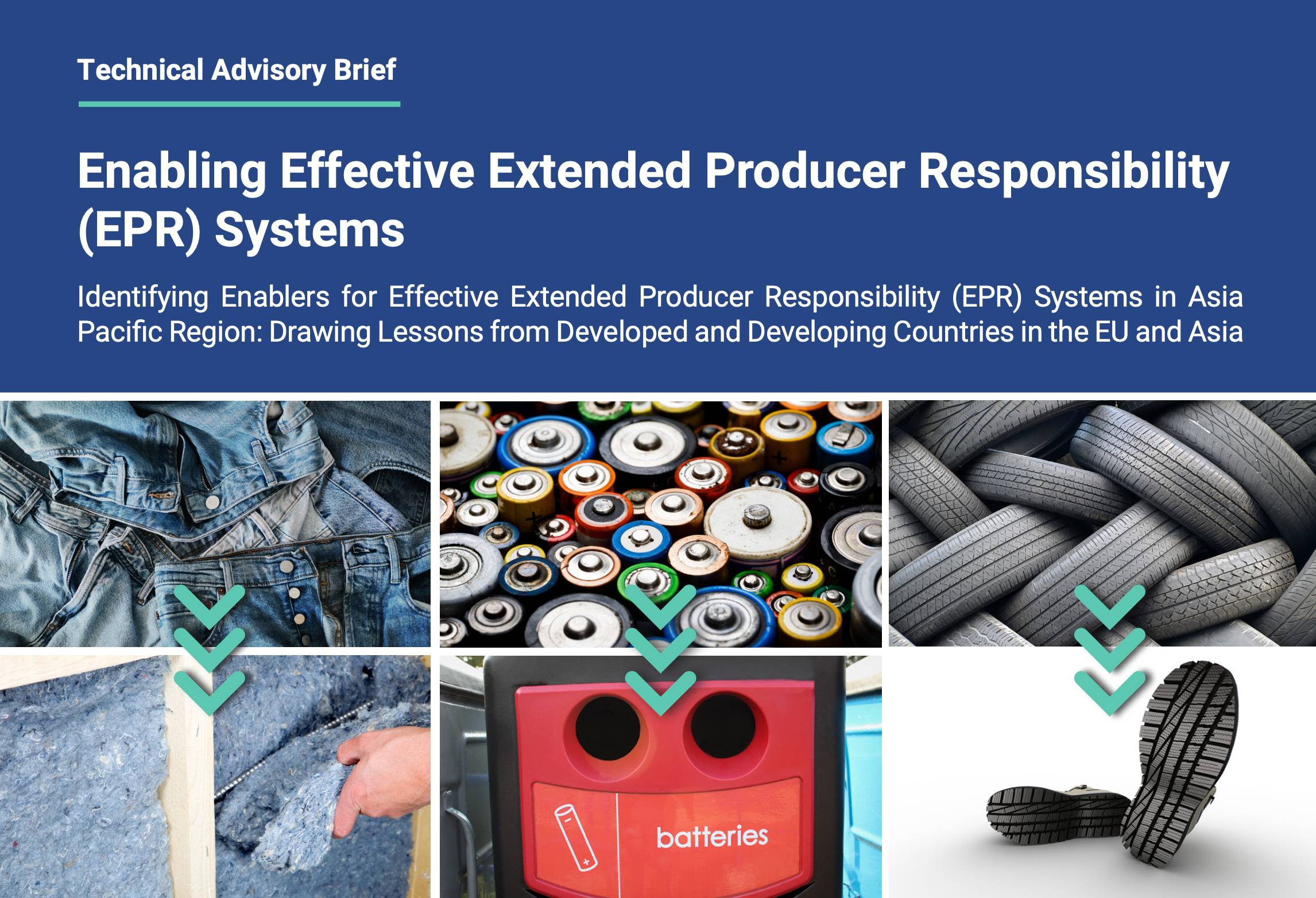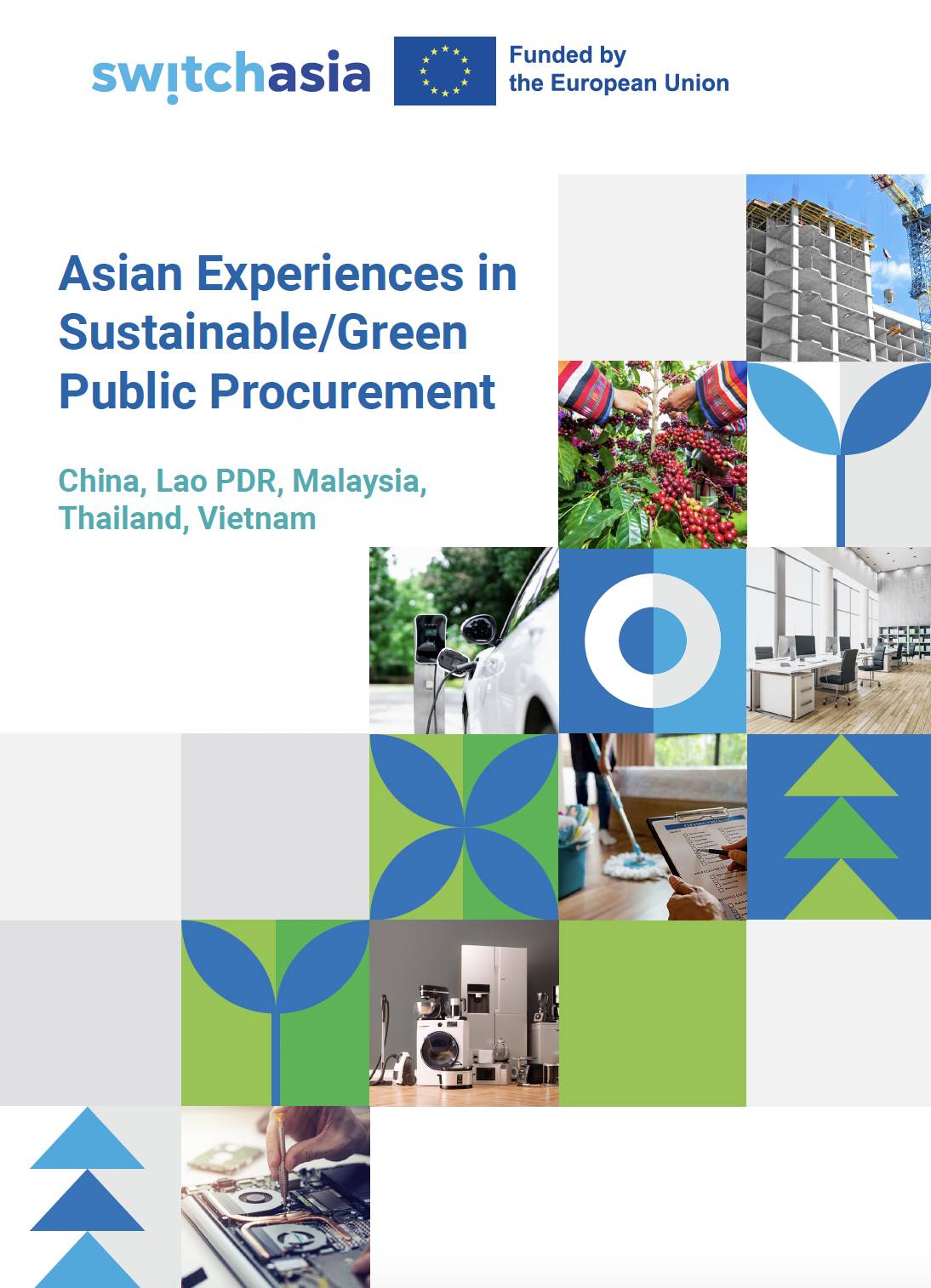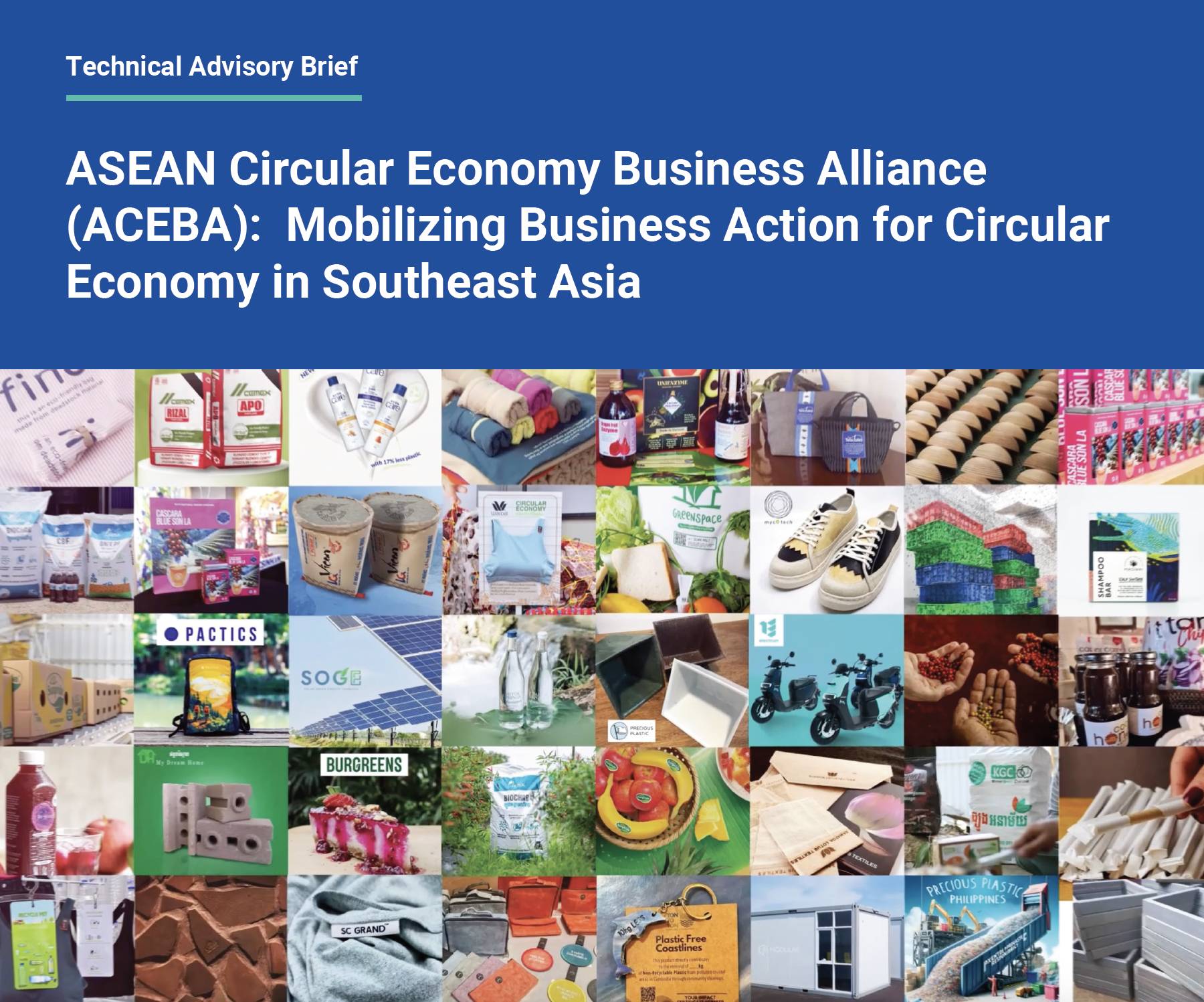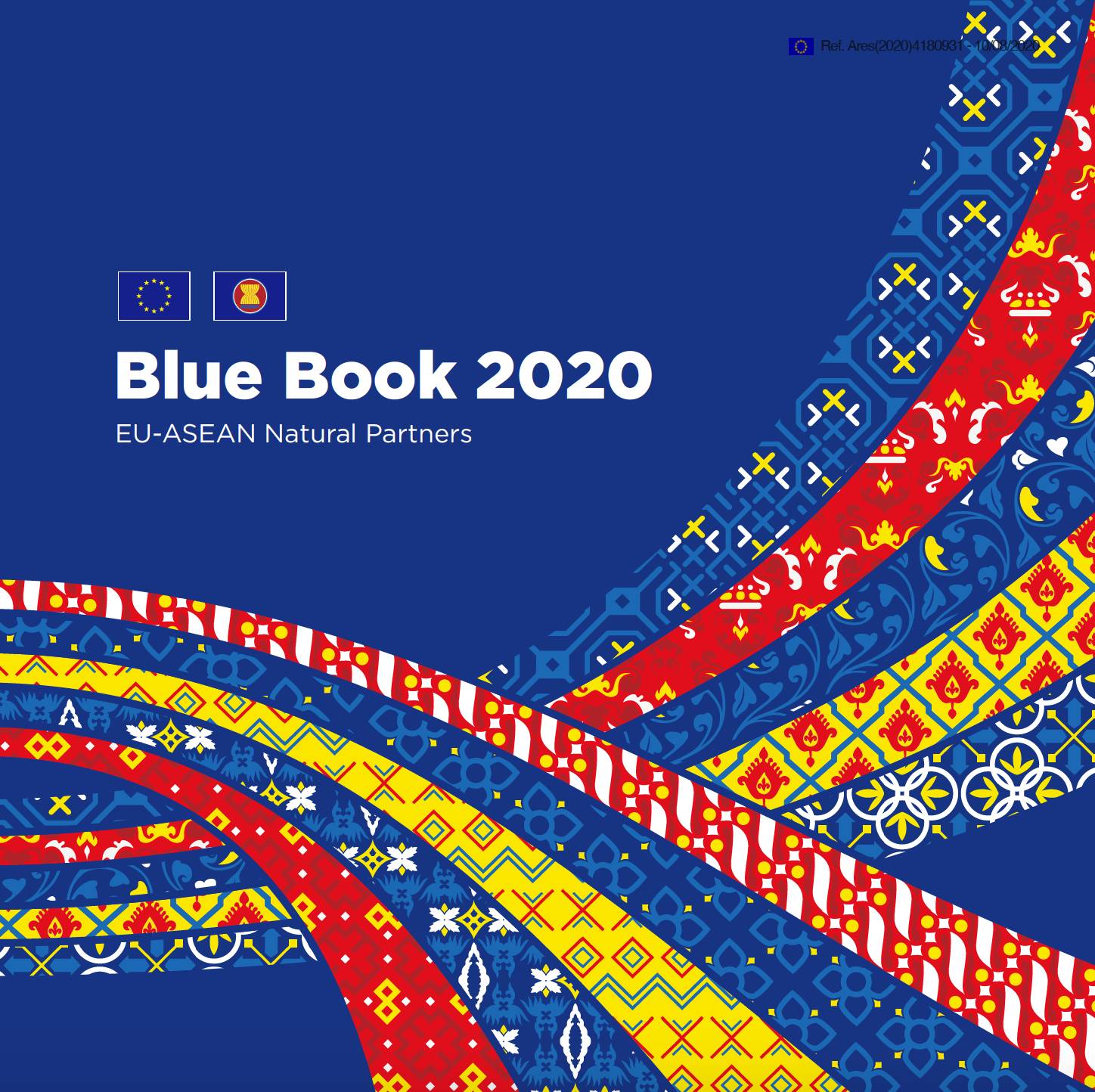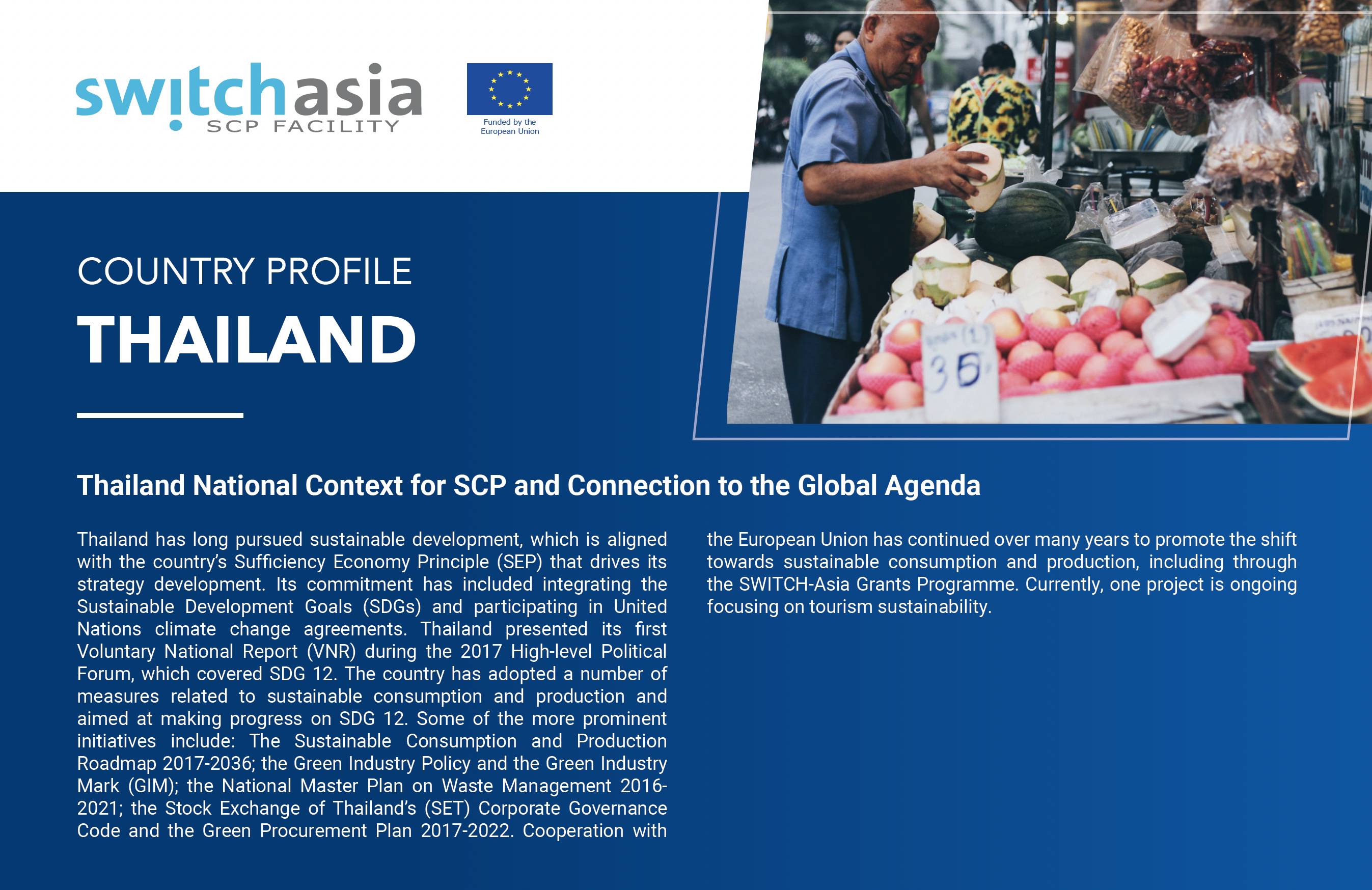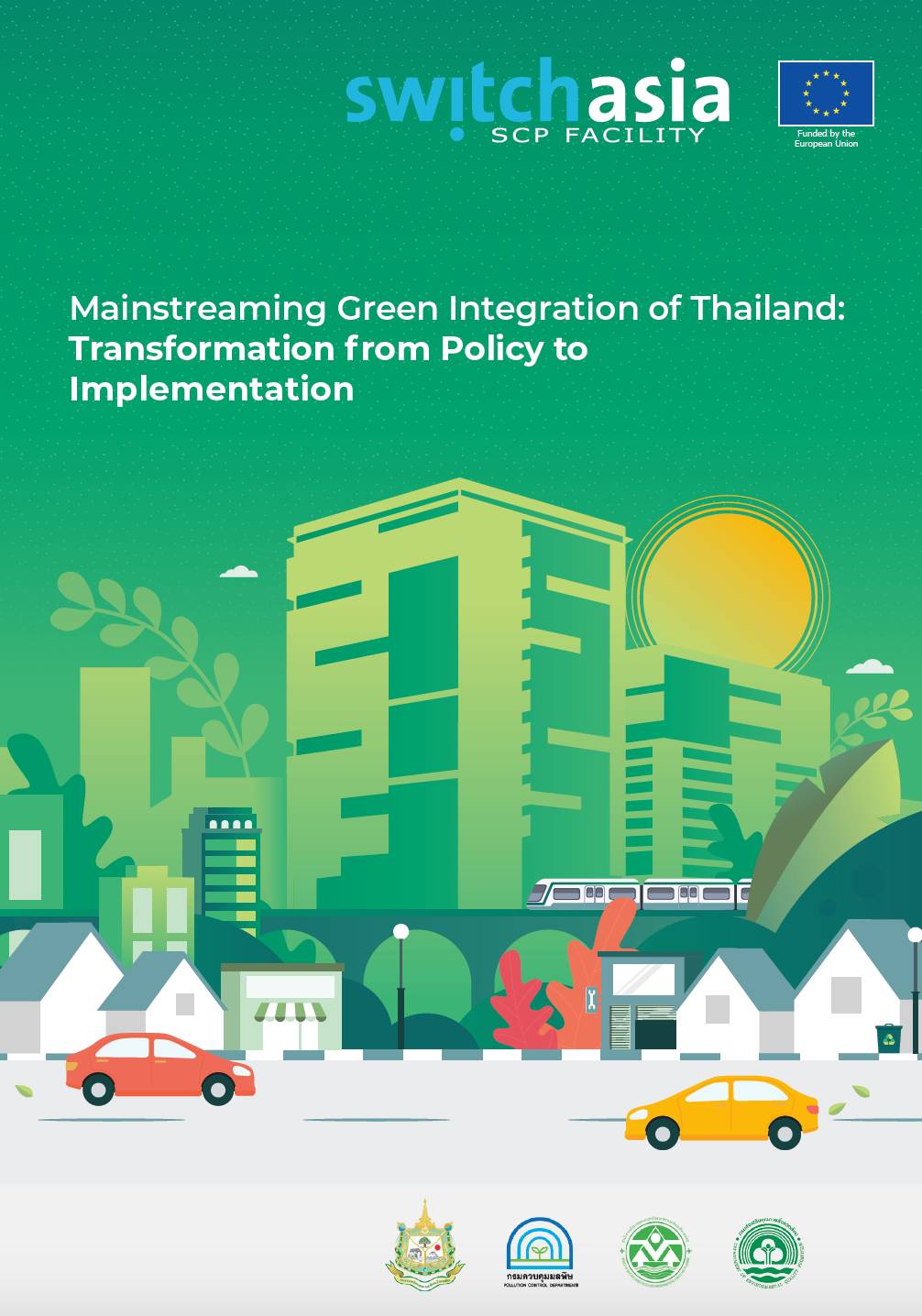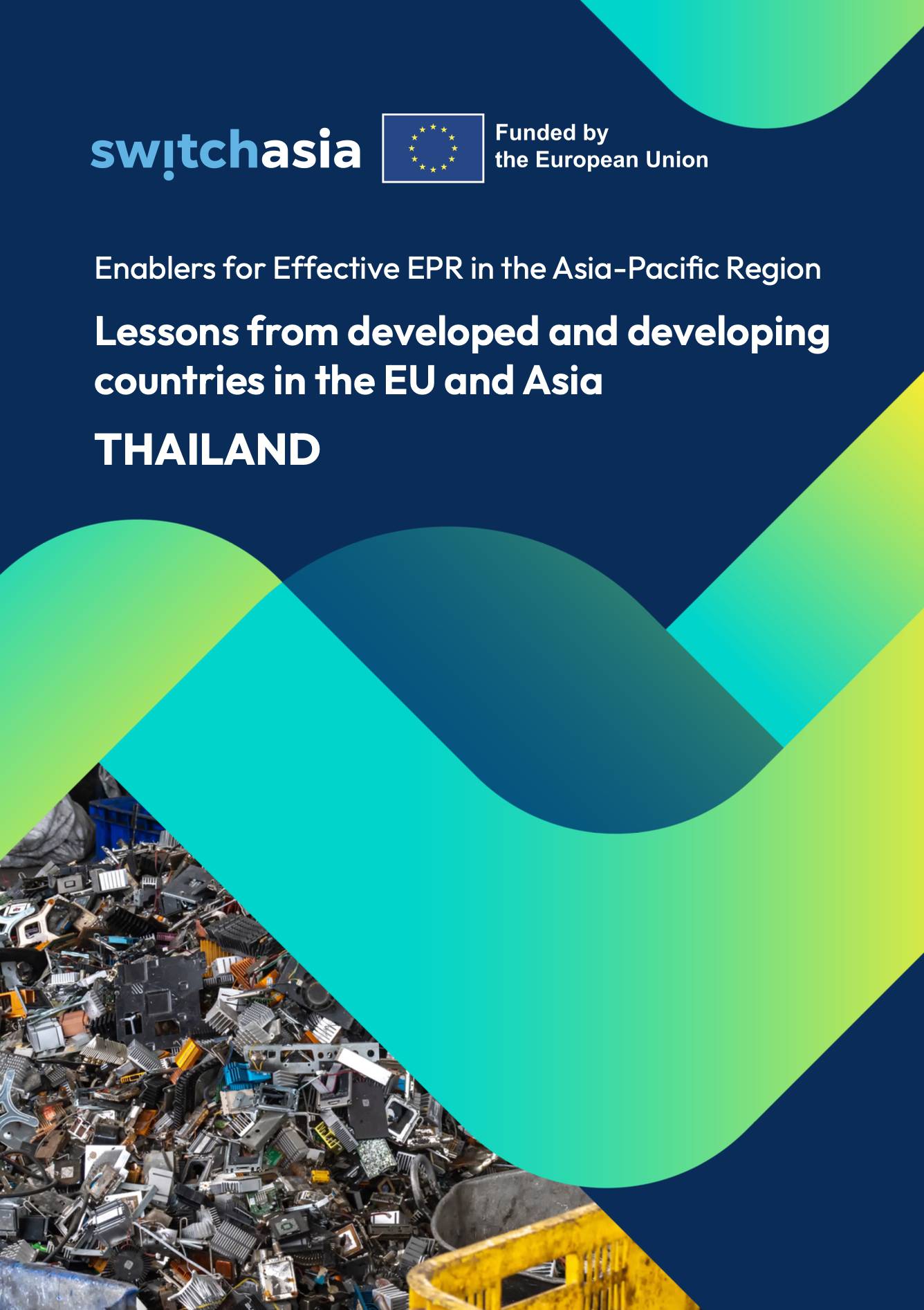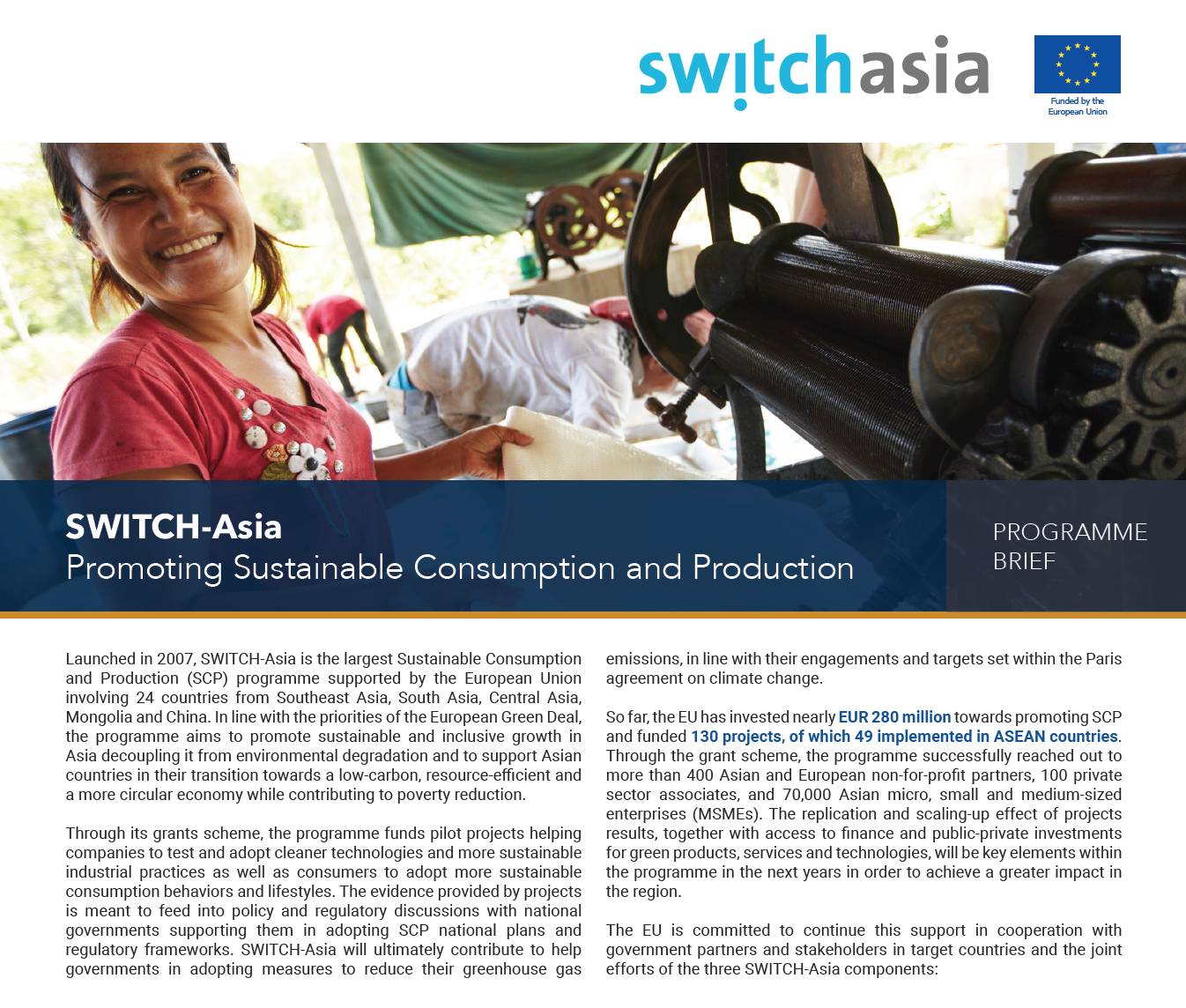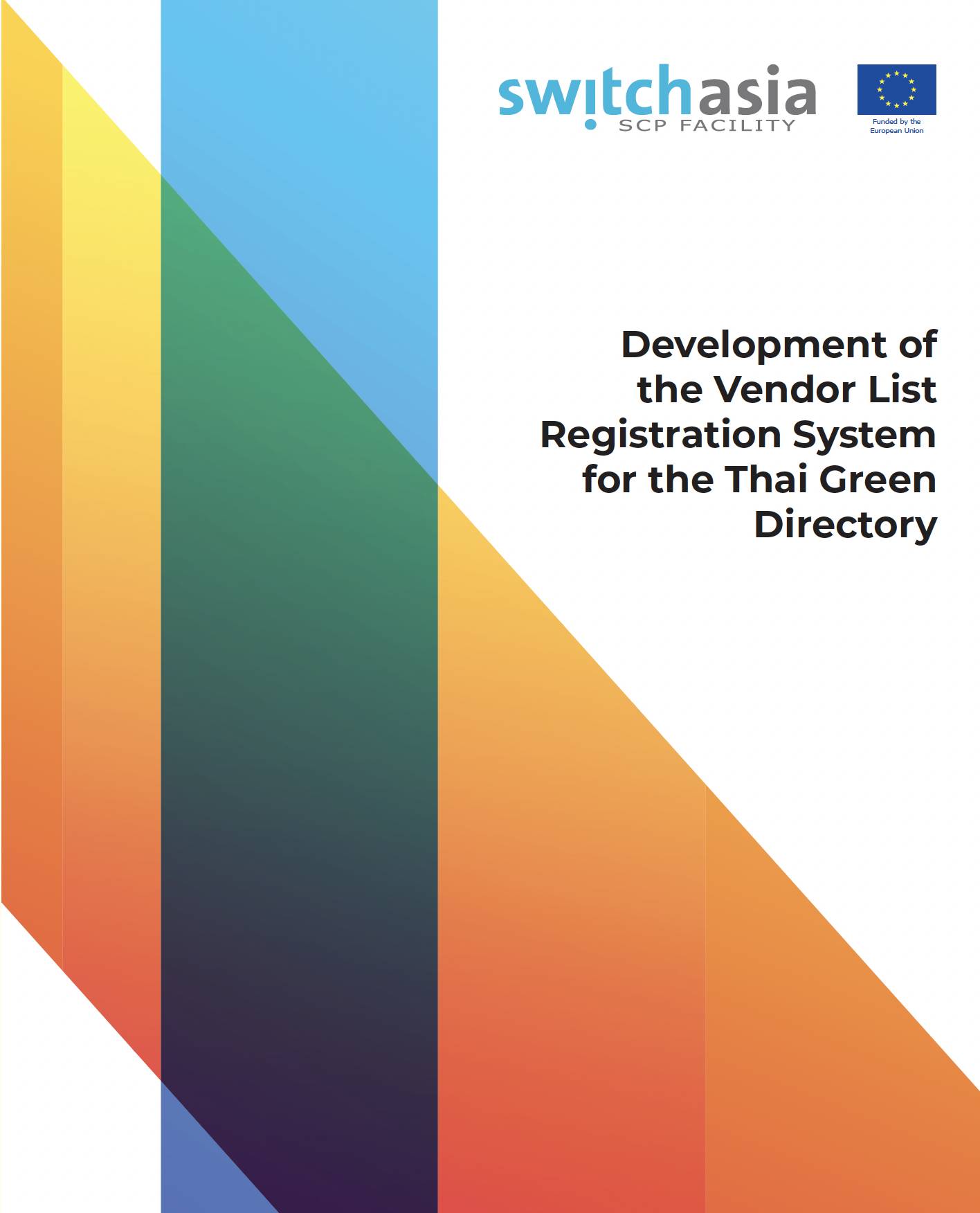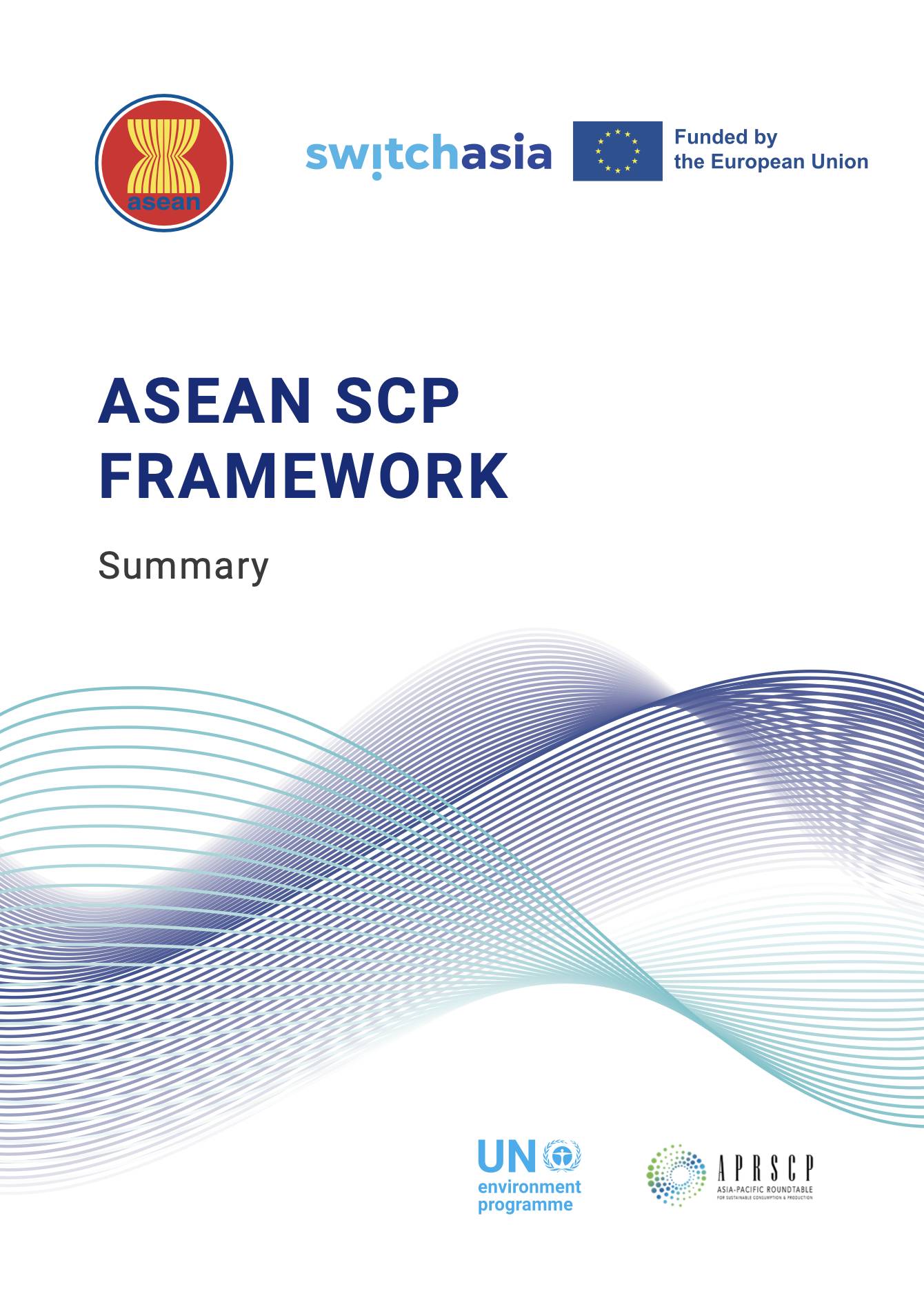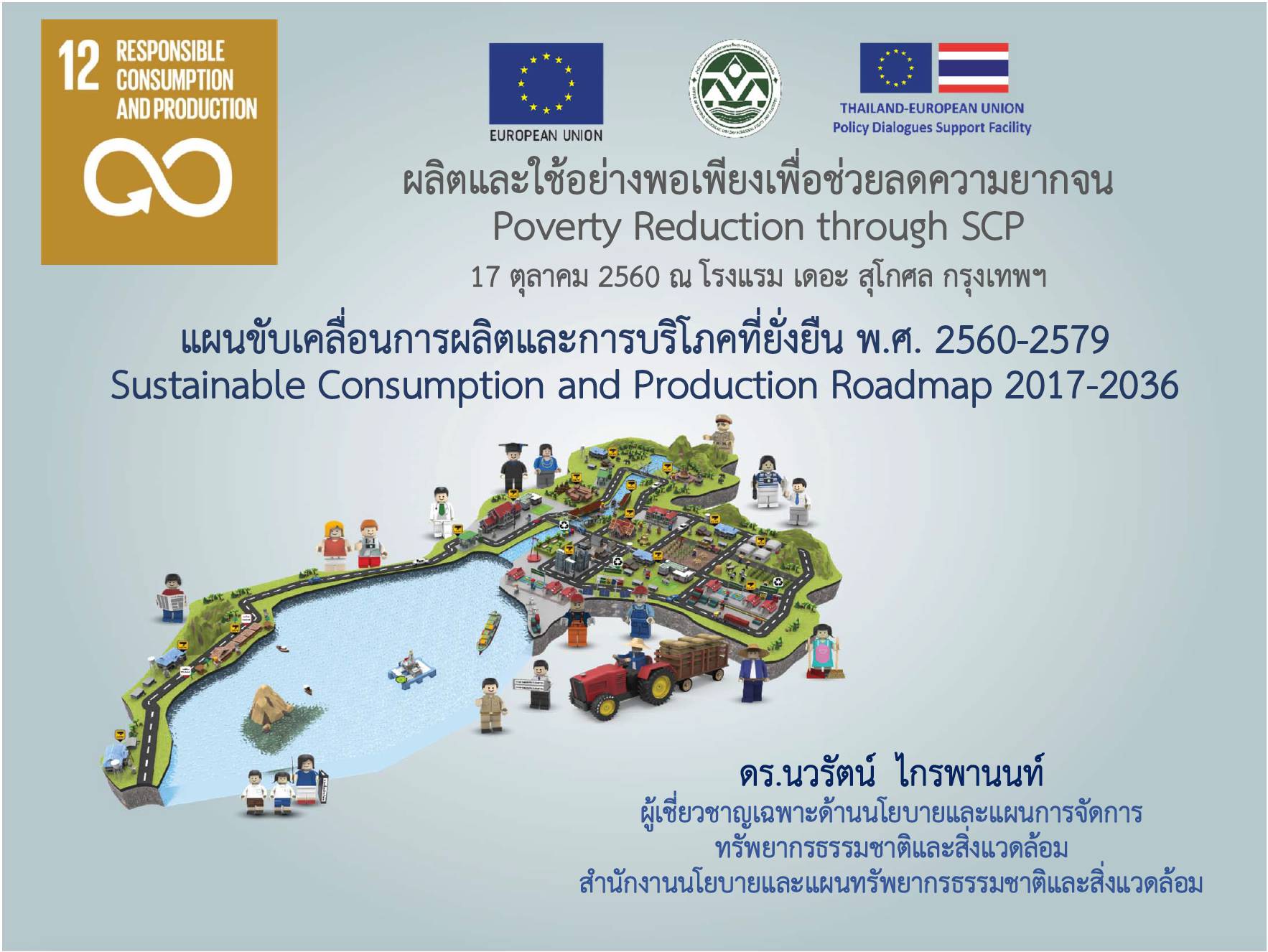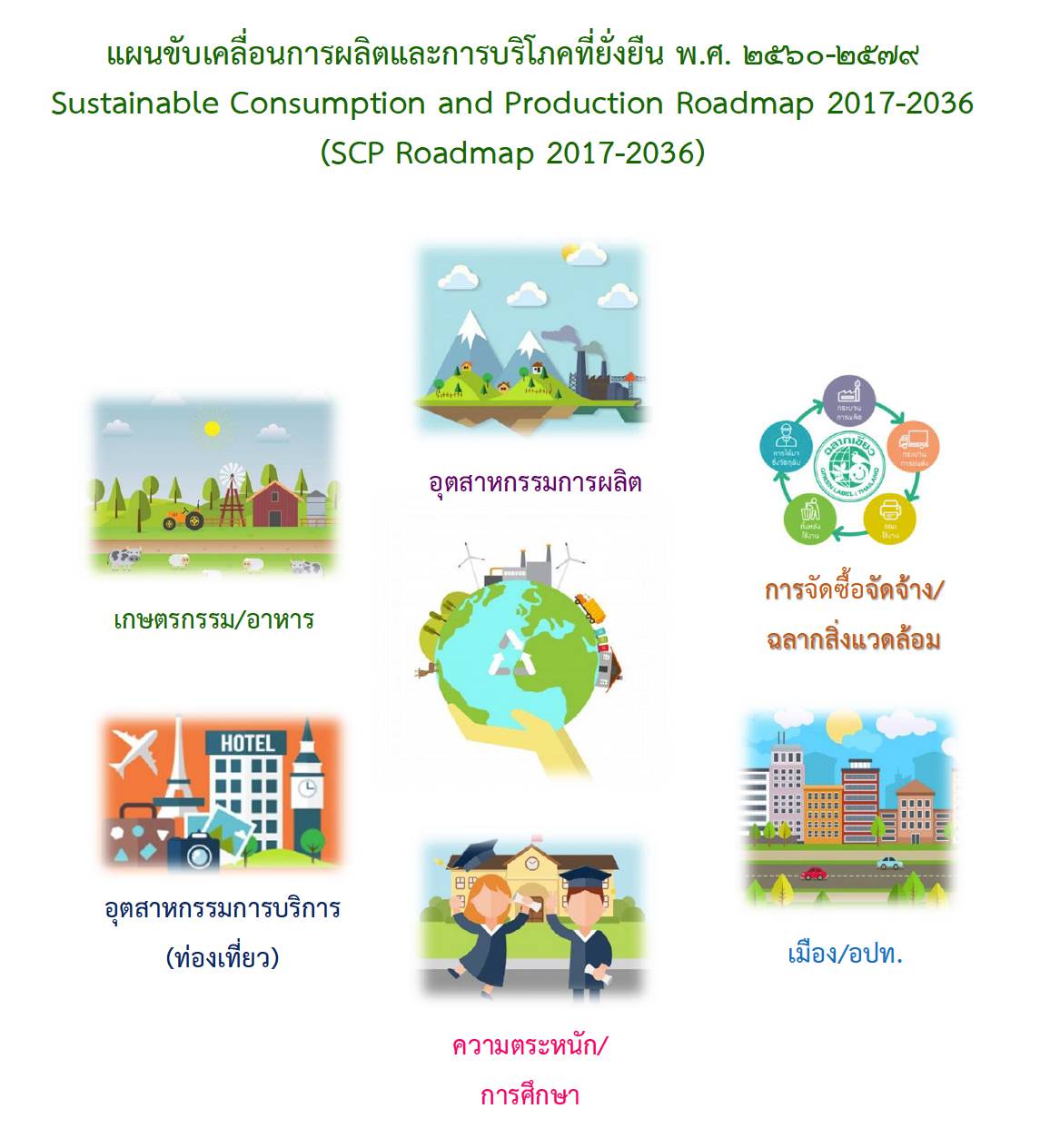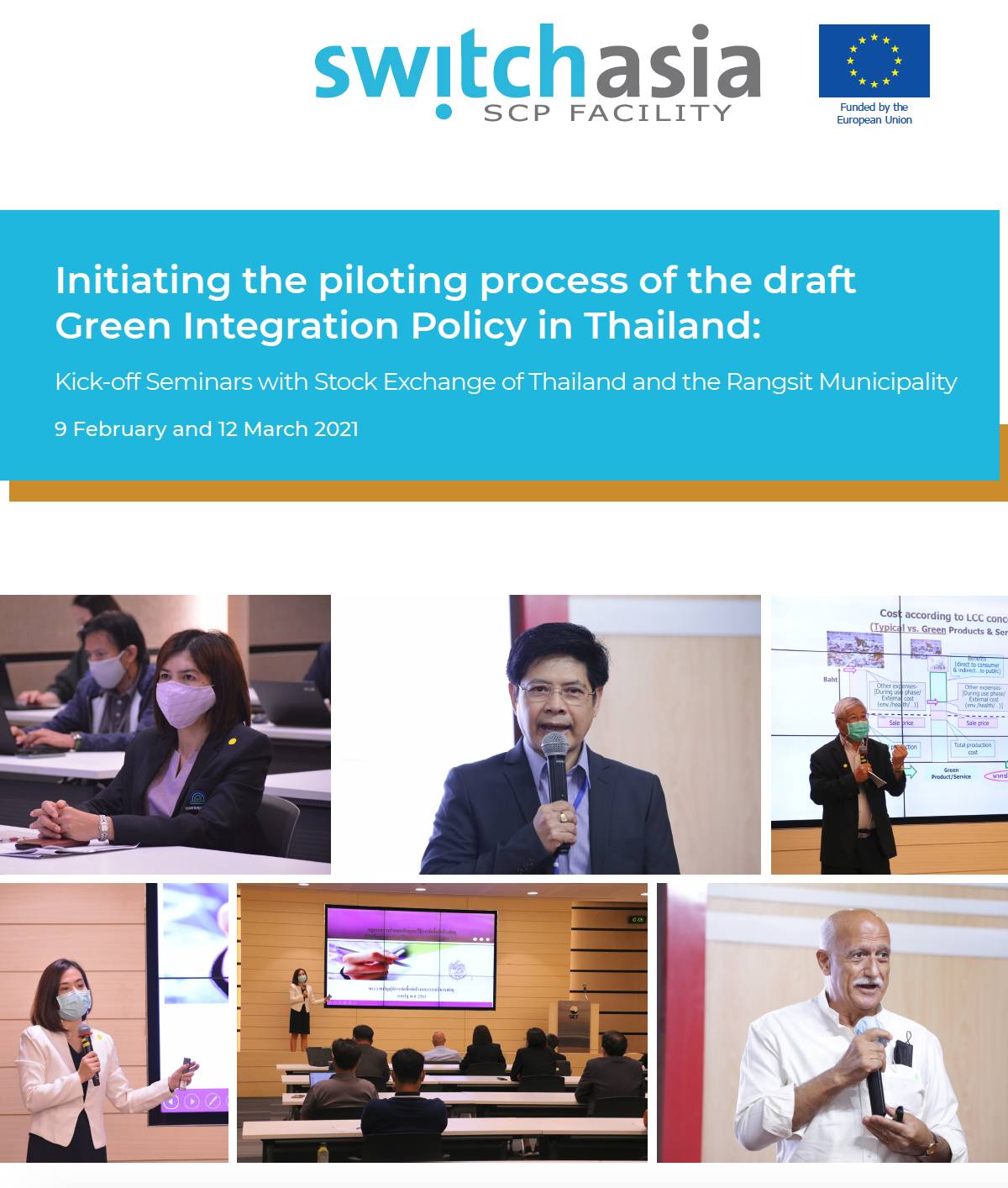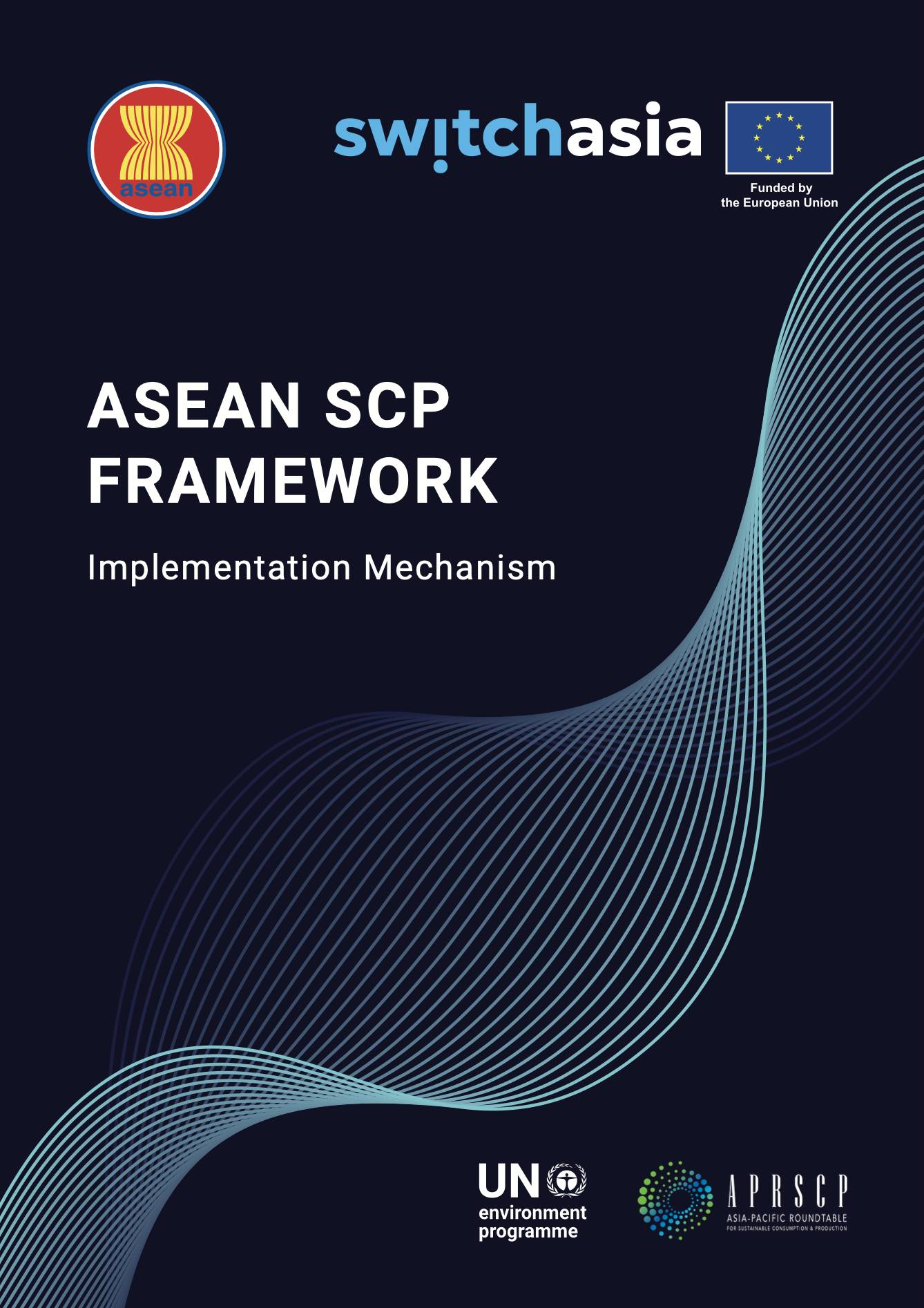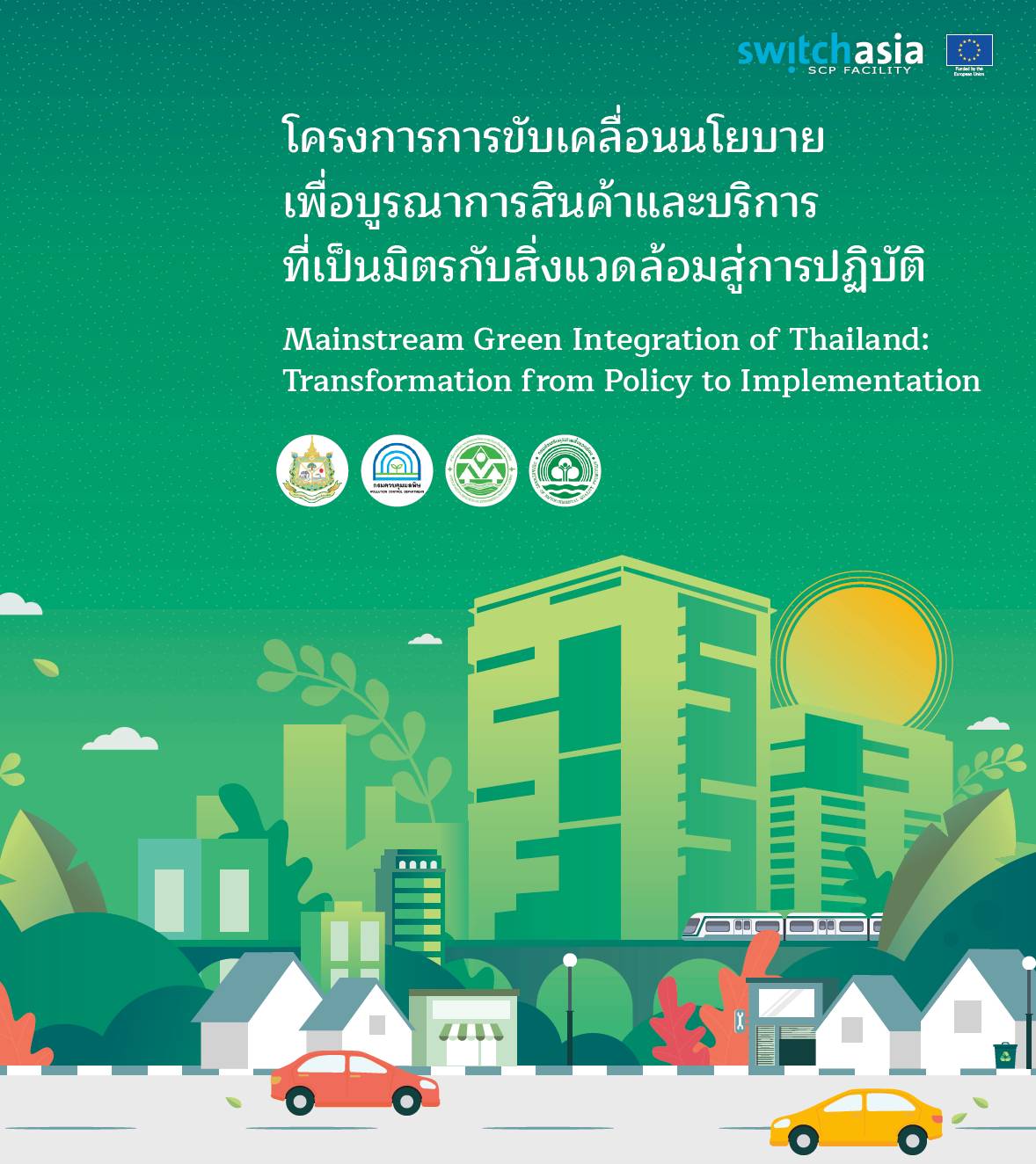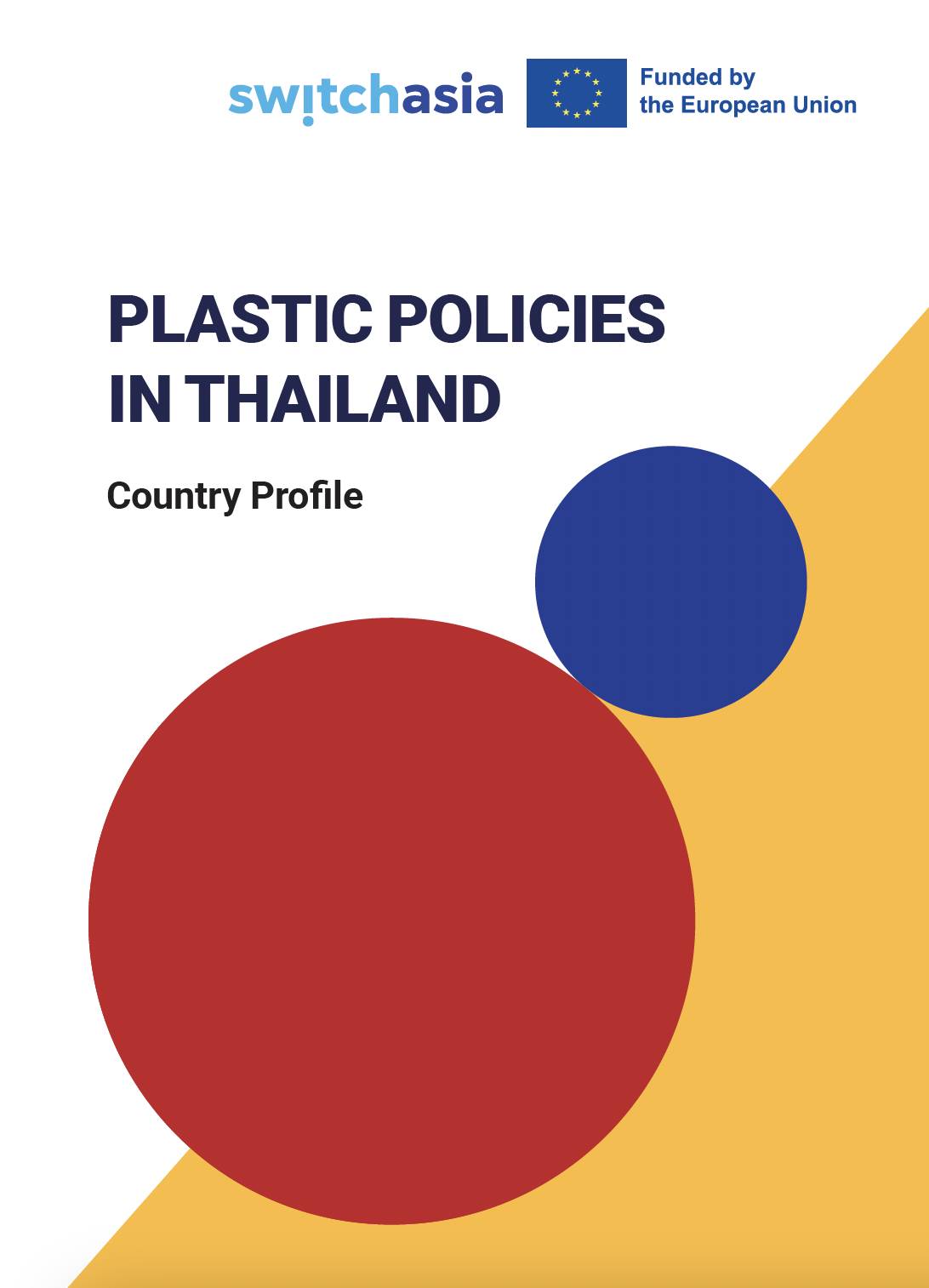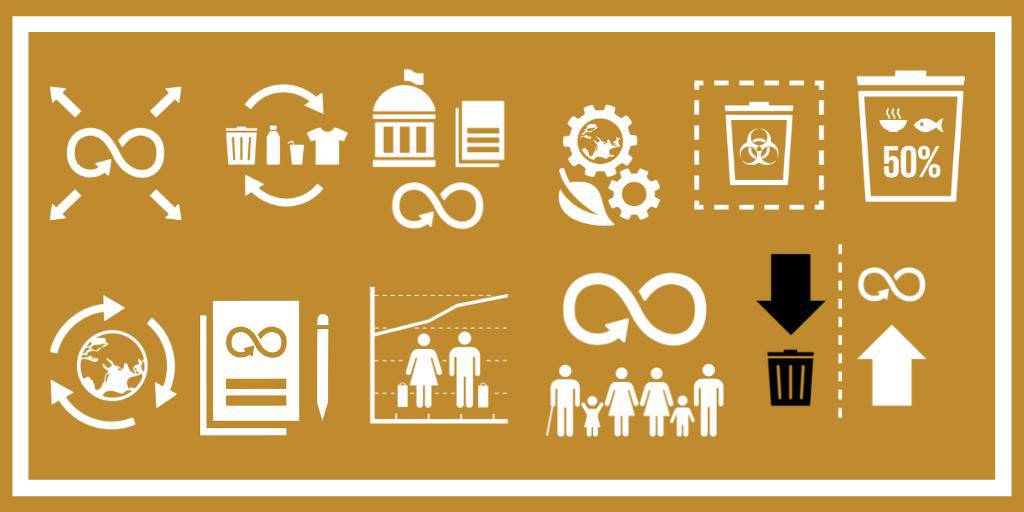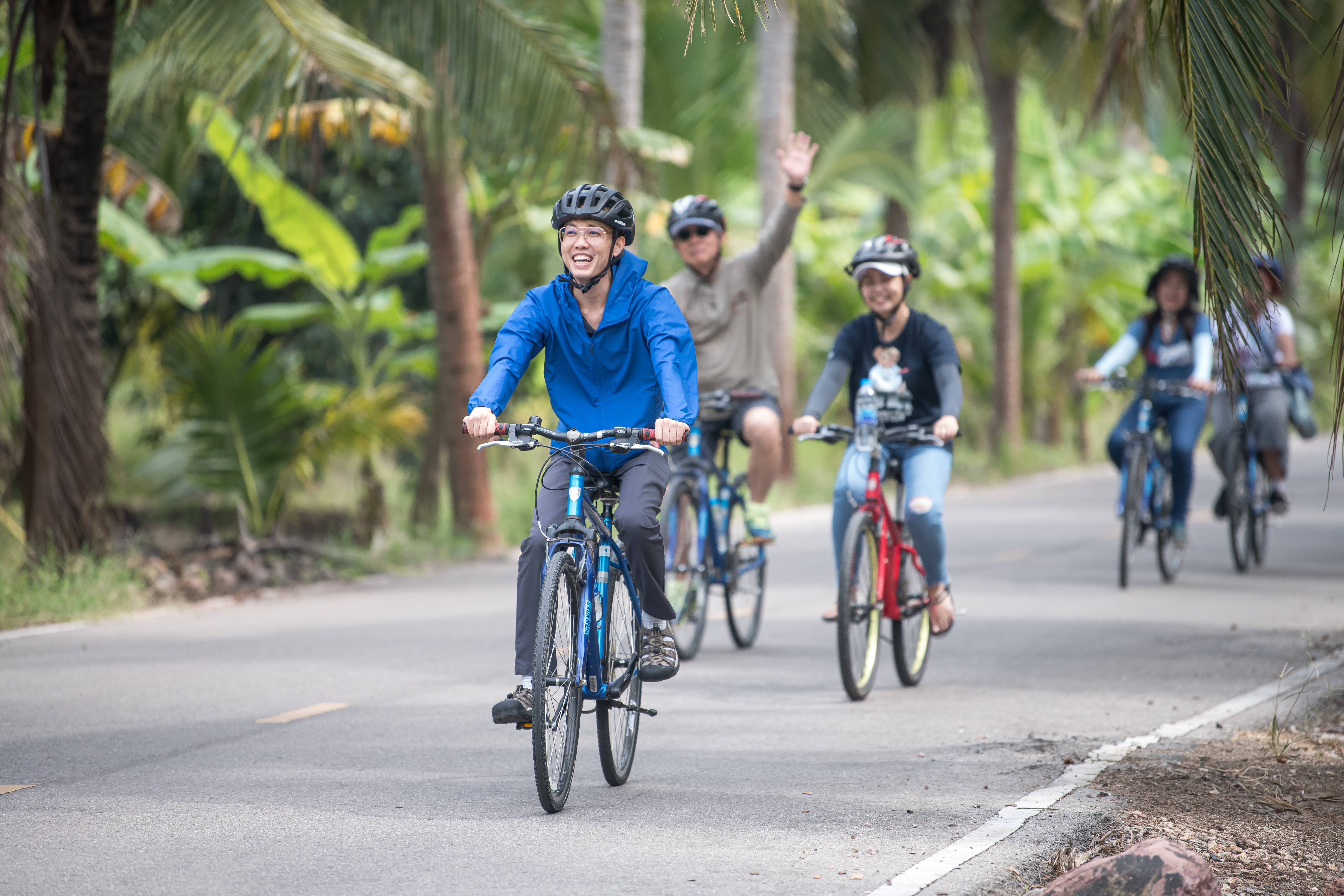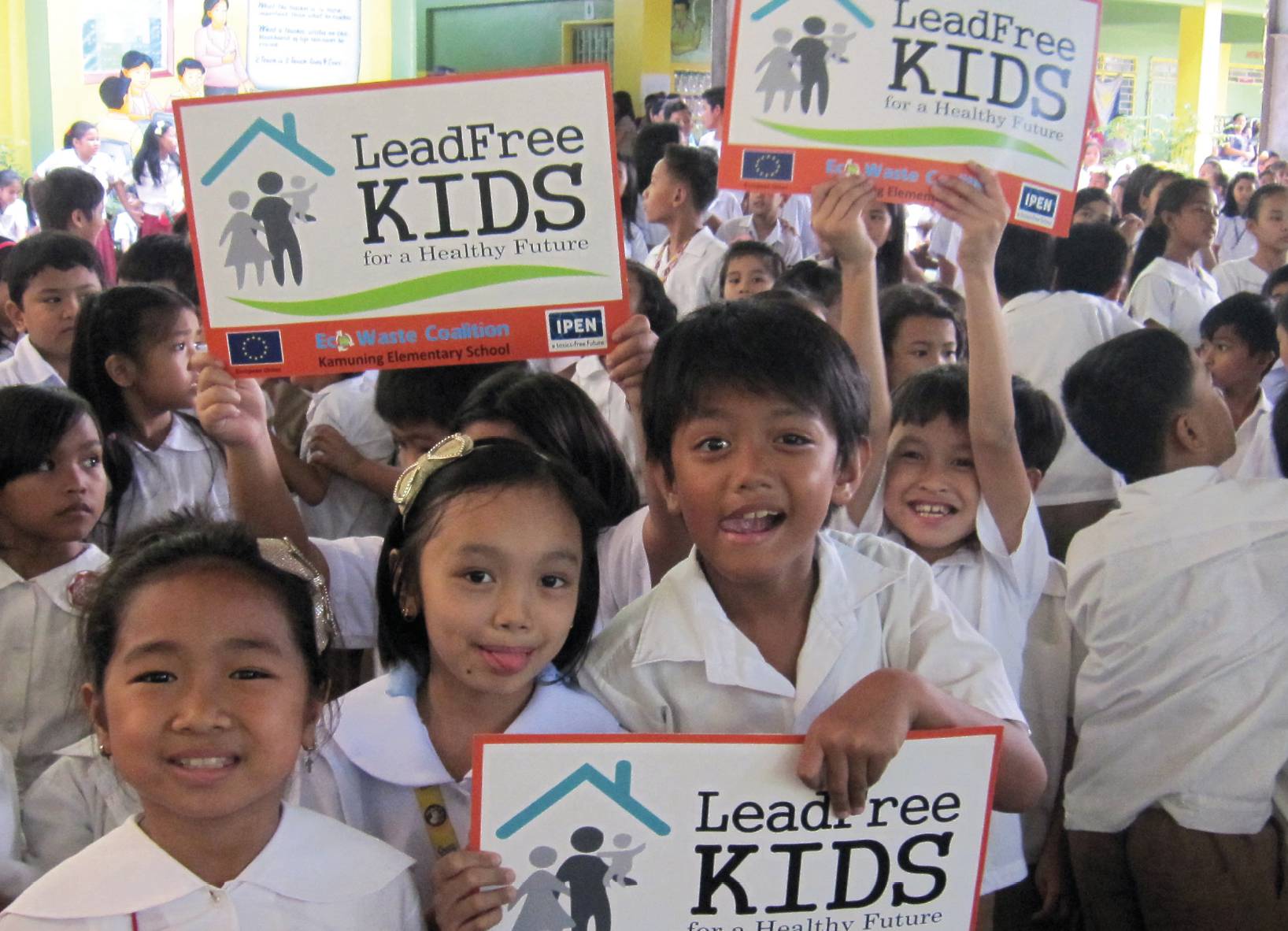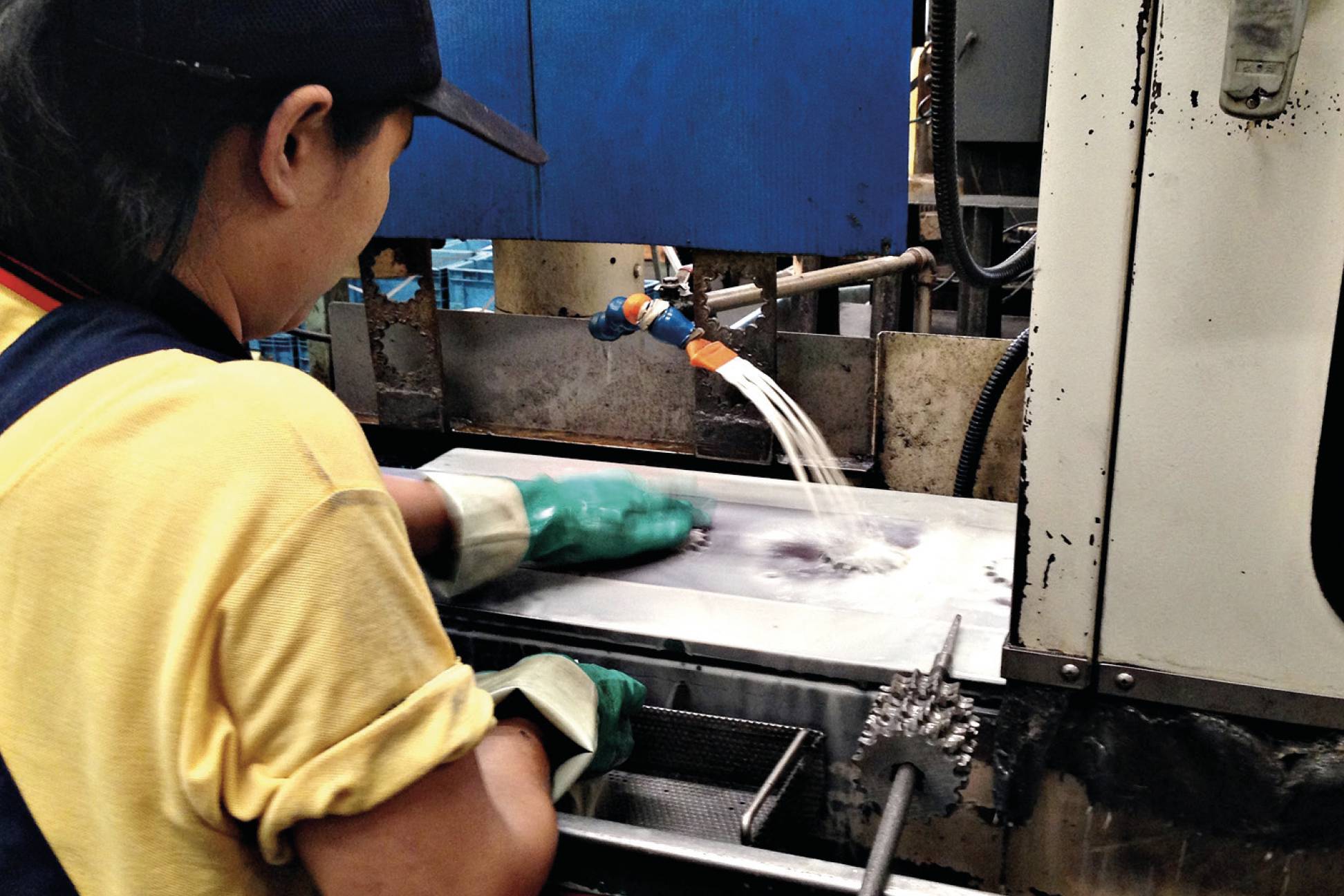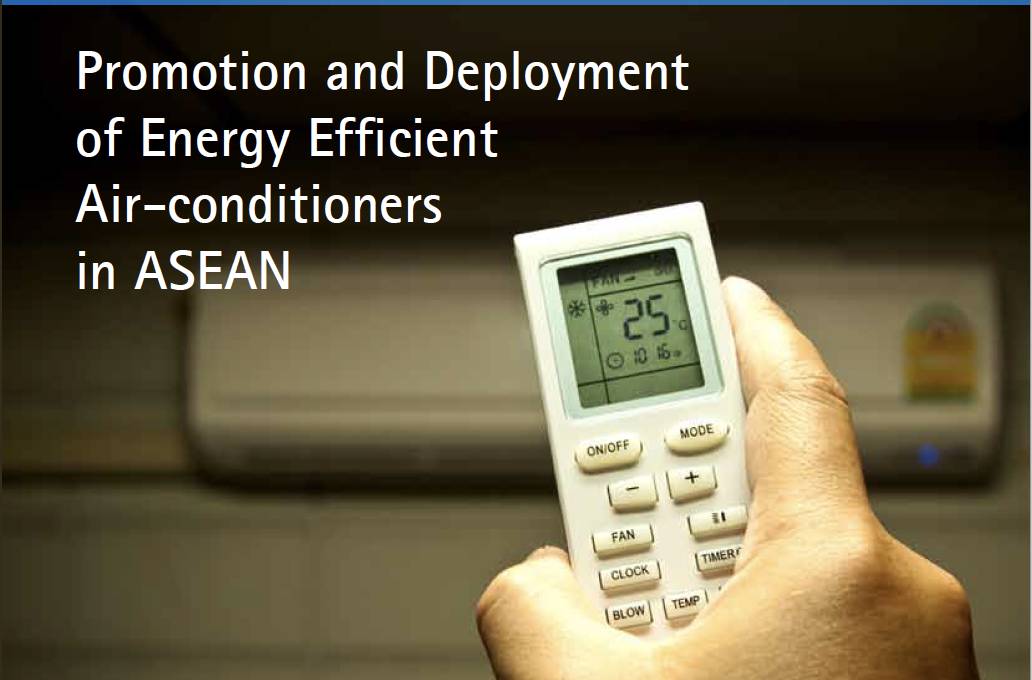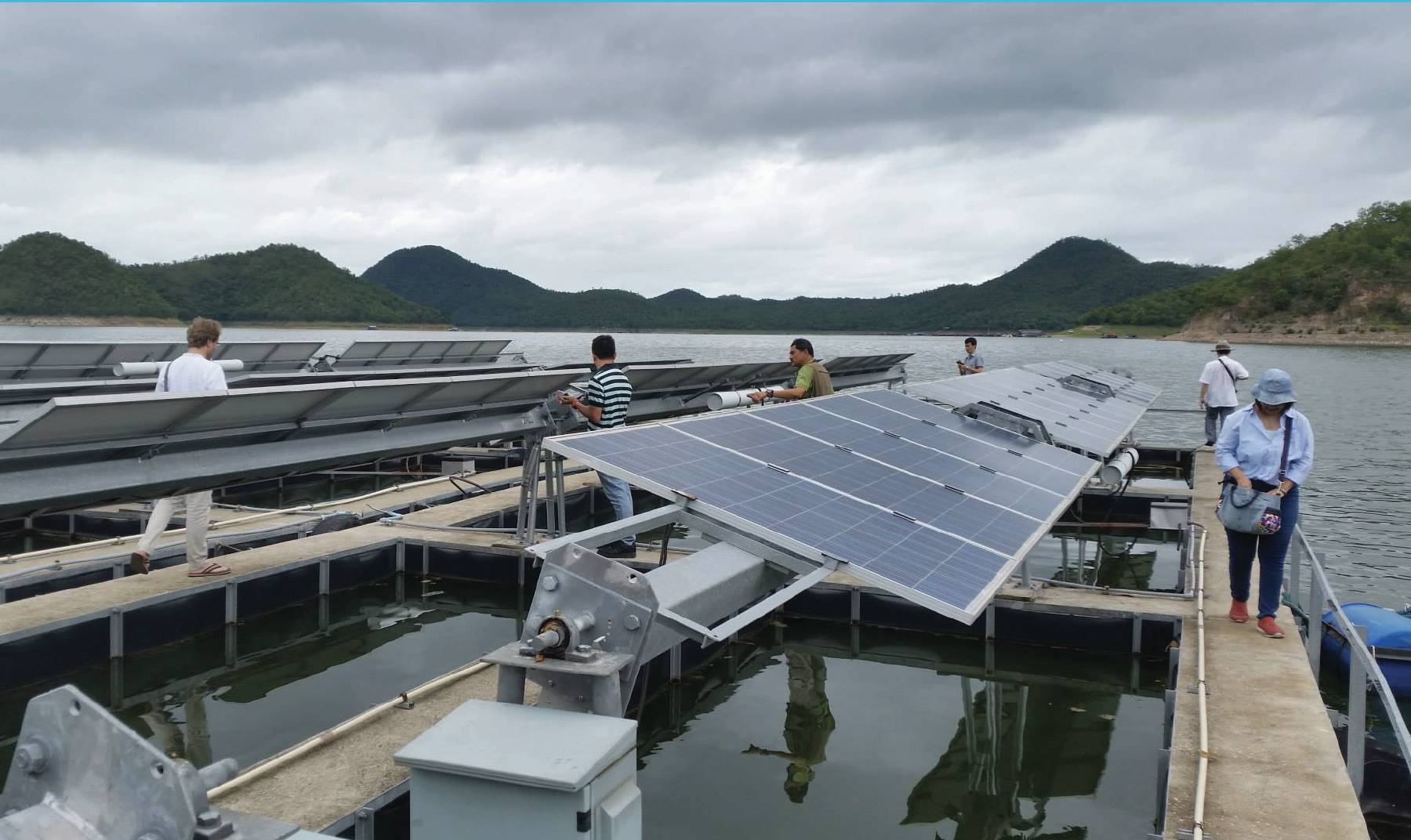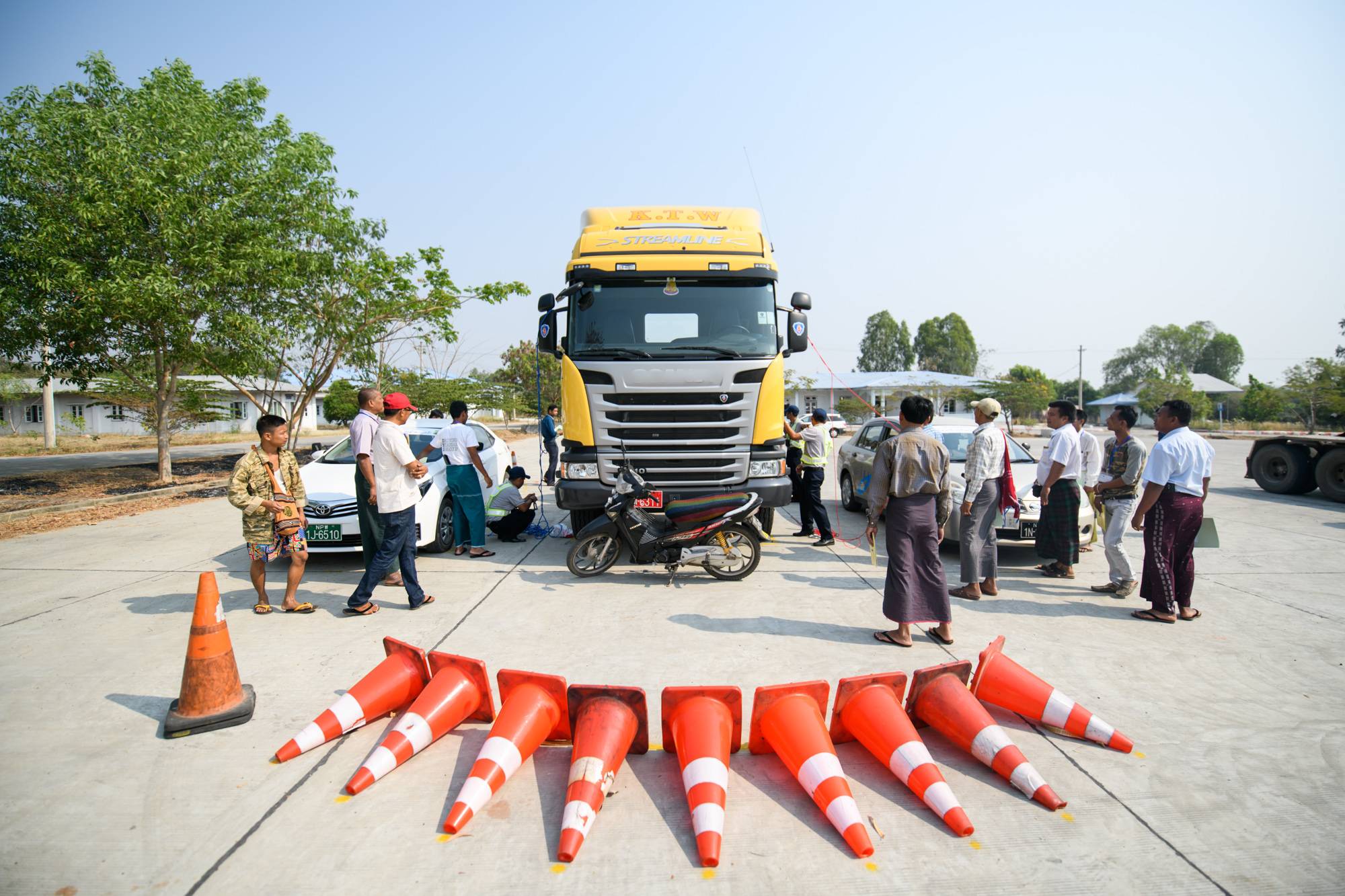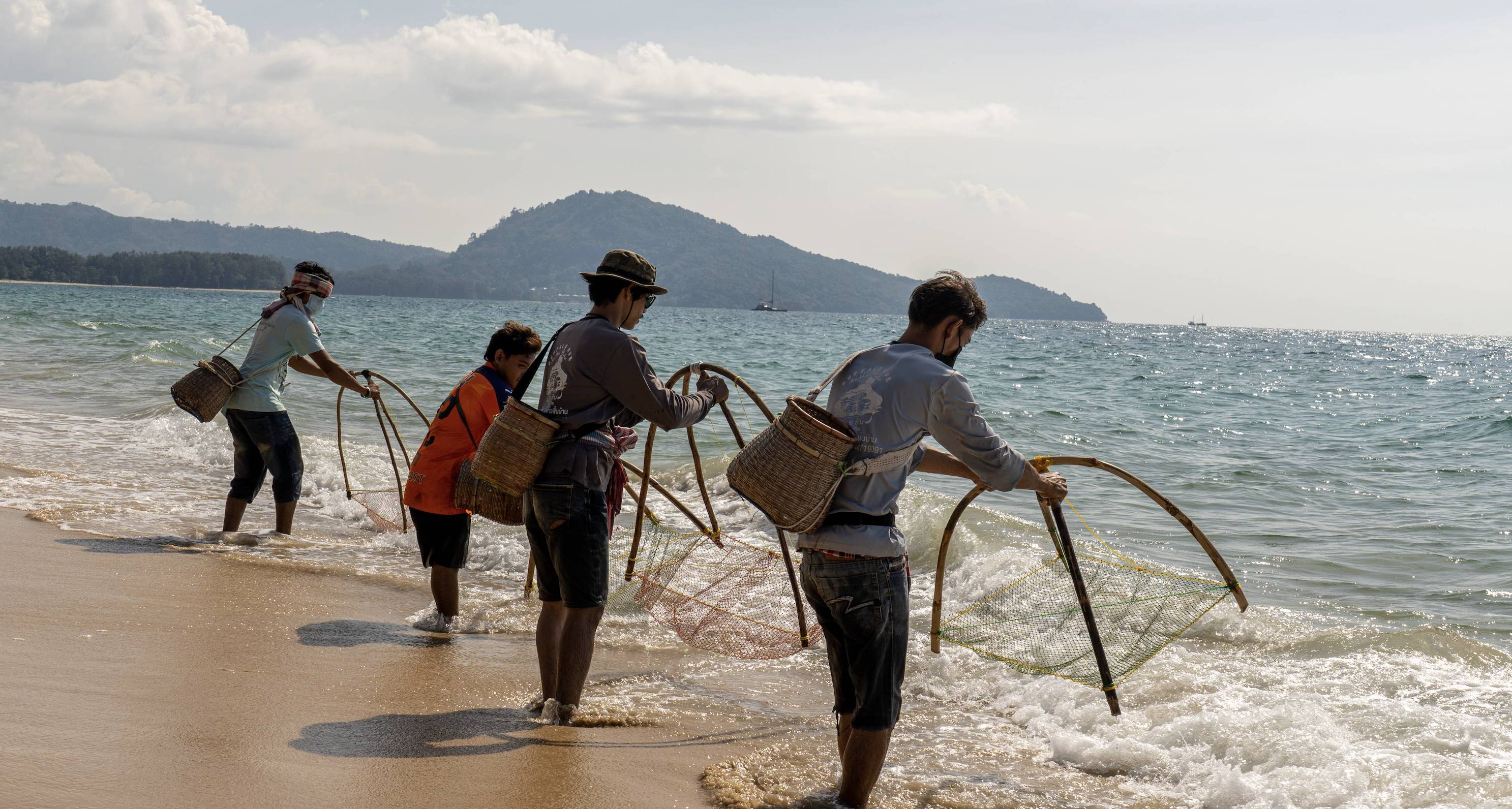
SCP Context
Thailand National Context for SCP and Connection to the Global Agenda
Thailand has long pursued sustainable development, which is aligned with the country’s Sufficiency Economy Principle (SEP) that drives its strategy development. Its commitment has included integrating the Sustainable Development Goals (SDGs) and participating in United Nations climate change agreements. Thailand presented its first Voluntary National Report (VNR) during the 2017 High-level Political Forum, which covered SDG 12. The country has adopted a number of measures related to sustainable consumption and production and aimed at making progress on SDG 12. Some of the more prominent initiatives include: The Sustainable Consumption and Production Roadmap 2017-2036; the Green Industry Policy and the Green Industry Mark (GIM); the National Master Plan on Waste Management 2016-2021; the Stock Exchange of Thailand’s (SET) Corporate Governance Code and the Green Procurement Plan 2017-2022. Cooperation with the European Union has continued over many years to promote the shift towards sustainable consumption and production, including through the SWITCH-Asia Grants Programme. Currently, one project focusing on driving sustainable food markets in Thailand is being implemented, and other six were conducted in 2010-2018.
Challenges
- Most efficiency programmes do not yet show desired results in terms of decoupling growth from total resource depletion.
- Adoption of sustainable lifestyles is not yet wide-spread, particularly among the growing middle-income bracket of Thailand where consumption rates are growing quickly.
- Reducing impacts from the transport and aviation sector, especially as Thailand is a hub for travel across Southeast Asia.
- Water productivity is low, which is of particular concern in relation to the agricultural and food processing sectors.
- There are limited sustainability and low-carbon policies and initiatives aimed at the automotive industry.
- SMEs continue to lack sufficient access to financial institutions while the also lack awareness on the benefits of investments that promote sustainability.
- Majority of farmers are still using traditional production methods, which have negative environmental impacts. Clean agricultural technology is not affordable.
Priorities
- Emphasising production process development, Green Industry certification and integrated solid waste management in the industrial sector.
- Sustainable tourism remains central to Thailand’s SCP-related goals as the industry remains important for the country’s economic health.
- Promotion of Green Public Procurement and eco-labelling.
- Education and awareness raising remain important for all SCP-related activities.
Opportunities
- SWITCH-Asia can support integration of key national authorities such as national government agencies, research institutions and civil society organisations to further identify priorities as well as promote dialogue on policies.
- Scale-up efforts on integration of SCP-content into the public education system via the Government’s 20-year National Education Plan to promote early adoption of sustainable lifestyles and behaviours.
- Expand the use of media to promote SCP awareness among the public.
- Leverage its position as a regional travel hub push for region-wide lower carbon and eco-friendly travel opportunities in collaboration with tour operators, the transport industry (particularly flight carriers) and tourism destinations.
- Expand cooperation with international organisations and institutions that would support and provide recommendations on implementing measures, good practices, creating statistical data and monitoring and evaluation on material footprints and domestic material consumptions in the future.
- Further exploration of innovative finance will help SMEs as well as those involved in the agricultural sector access clean technology.
SWITCH-Asia Activities
2018
SCP Facility
- Preliminary assessment of SCP related policies, activities, needs/gaps, and opportunities.
Regional Policy Advocacy Component (RPAC)
Facilitated the participation of Thai key-stakeholders in the following regional/ sub-regional activities:
- Asia Pacific Low Carbon Lifestyles Challenge (19-22 Mar 2018), hosted by Thailand, regional level
- Transforming Asia Pacific: Innovative Solutions, Circular Economy and Low Carbon Lifestyles (17-19 Sep 2018), hosted by Thailand, regional level
- Asian Circular Economy Leadership Academy (3-8 Dec 2018), hosted by Thailand, regional level
2019
SCP Facility
- In line with first demand, support was provided to 4 local authorities on mainstreaming SCP in local management, focusing on waste management at local municipality level and greening schools;
- A multi-stakeholder consultation on SCP and Circular Economy through sustainable tourism and food waste was organised on 12 July 2019;
- A new demand was received from the National Focal Point to further mainstream Green Integration in Thailand with a focus on green products and services.
- A concept note with specific actions and timeline has been prepared and the term of reference for experts will be prepared in early 2020.
Regional Policy Advocacy Component (RPAC)
Facilitated the participation of Thai key-stakeholders in the following national activity:
- Awareness raising campaign on “Green Mobility and SCP” - This event was organised back-to-back with the 2019 World Environment Day (WED) and it focused on “Beat Air Pollution” (5 Jun 2019), Thailand, national level
Facilitated the participation of Thai key-stakeholders in the following regional/sub-regional activities:
- “Sustainability Reporting – Thinking Circular Economy by Businesses” - This event was organised back-to-back with 2019 Asia Pacific Forum on Sustainable Development (27 Mar 2019), hosted by Thailand, regional level
- Businesses Accelerating Inclusive Green Economies – "Leaving No One Behind” - Side event on the Responsible Business and Human Rights Forum co-organised by the Royal Thai Government, OECD, United Nations Development Programme (UNDP), ESCAP, International Labour Organization (ILO) and with the participation of the UN Working Group on Business and Human Rights (11 Jun 2019), hosted by Thailand, regional level
- 2019 Southeast and Northeast Asia Policy Dialogue and Training on “Harmonizing SPP practices and Measuring SPP benefits” - The activity took place in parallel with a series of events related to green procurement organized by the China Environmental United Certification Center (CEC) (23 - 25 Oct 2019), hosted by China, regional level
- WEBINAR: SDG 12.1 Reporting for SWITCH-Asia Countries – Connecting the dots between actions and reporting (5 Nov 2019), regional level
- Policy Dialogue on SDG12 Reporting (21 Nov 2019), hosted by Vietnam, regional level
- 2019 SWITCH-Asia Leadership Academy on Circular Economy (2-6 Dec 2019), hosted by China, regional level
- "Supporting decision making on SCP through training on Sustainable Procurement” - This event was organised back-to-back with International Conference on Sustainable Energy and Green Technology 2019 (11 Dec 2019), hosted by Thailand, regional level
2020-2021
SCP Facility
Collaboration with the National Focal Point, the Ministry of Natural Resources and Environment, for the SCP Facility to implement the following activities:
- Green products and services policies and criteria were reviewed, and presented the recommendations on G/SPP criteria in terms of clustering the environmentally friendly products and services into various groups.
- Green Integration Policy and the National Green Directory framework developed and officially endorsed, in consultation with concerned government agencies and stakeholders and through demonstration projects in pilot areas.
- Coordination with GIZ Advance SCP on GPP Implementation and the Thai SCP Network.
2020
Regional Policy Advocacy Component (RPAC)
Facilitated the participation of Thai key-stakeholders in the following national activities:
- WEBINAR: WED2020 Thailand 2020 and Beyond – The event was proposed as a part of the 2020 World Environment Day (WED) celebration which focused on “SCP and Biodiversity Conservation” (5 Jun 2020), Thailand, national level
Facilitated the participation of Thai key-stakeholders in the following regional/sub-regional activities:
- SWITCH2Green Meeting - RPAC initiated the discussion and shared the first report in 2020. (April 2020)
- MOVING THE NEEDLE ON CLIMATE CHANGE – The event was co-organised by the UNESCAP as a part of the 2020 Virtual United Nations Responsible Business and Human Right Forum (RBHRF) (10 Jun 2020), regional level
- WORLD ENVIRONMENT DAY 2020 – A media kit was provided to call for action to promote SCP as a part of the 2020 World Environment Day (WED) celebration (5-7 Jun 2020), regional level
- Intervention in regional forum: Webinar on Sustainable Lifestyles for Plastics & Packaging Waste Management During a Pandemic COVID-19 (6 Aug 2020), regional level
- SCP in Tourism: Opportunities and Challenges with COVID-19 (8 Oct 2020), regional level
- Innovation and Connectivity through Farm to Fork (13 Nov 2020), regional level
- Sustainable Lifestyles for SCP (19 Nov 2020), regional level
- Support to Steering Committee of SWITCH-Asia – Provide support for the annual Steering Committee Meeting to review each country proposed 2021 workplan (3 Dec 2020), regional level
- Regional Policy Dialogue on Circular Cities (4 Dec 2020), regional level
- Regional Dialogue Driving Mechanisms for Eco-Design in Asia (9 Dec 2020), regional level
- Leadership Academy on Circular Economy 2020 (14-18 Dec 2020), regional level
- Webinar: Innovations & Startups (16 Dec 2020), regional level
2021
Facilitated the participation of Thai key-stakeholders in the following national activity:
- World Environment Day 2021 Thailand - The event was proposed as a part of the 2021 World Environment Day (WED) celebration which focused on “Ecosystem restoration” (4 June 2021), Thailand, national and regional level
Facilitated the participation of Thai key-stakeholders in the following regional/sub-regional activities:
- Contextualising the Circular Economy for Action (4 Feb 2021), regional level
- Virtual Consultation: Mapping SCP in ASEAN Countries (17 March 2021), sub-regional level
- Technology for Circular Economy: A Prologue to the 2021 SWITCH-Asia Leadership Academy (25 March 2021), regional level
- Circular Economy and Sustainable Lifestyles Course (18 May 2021), regional level
2022
SCP Facility
- Online vendor list registration system developed and integrated into the National Green Directory platform, in cooperation with the Pollution Control Department (PCD) and the Federation of Thai Industries (FTI).


